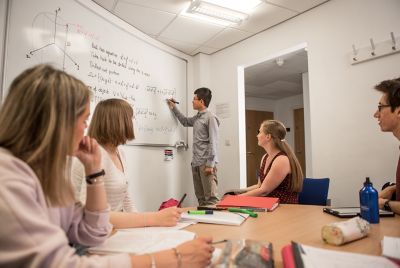Additional costs
All students will need at least one device to approve security access requests via Multi-Factor Authentication (MFA). We also recommend students have a suitable laptop to work both on and off-campus. For more information, please check the equipment advice.
As a student on this course, you should factor some additional costs into your budget, alongside your tuition fees and living expenses.
Books
You should be able to access most of the books you’ll need through our libraries, though you may wish to purchase your own copies.
Printing
Due to our commitment to sustainability, we don’t print lecture notes but these are available digitally.
Study abroad
If you study abroad, you need to consider the travel and living costs associated with your country of choice. This may include visa costs and medical insurance.
Equipment
To support your studies, the university recommends you have a suitable laptop to work on when on or off campus. If you already have a device, it is unlikely you will need a new one in the short term. If you are looking into buying a new device, we recommend you buy a Windows laptop, as it is more flexible and many software packages you will need are only compatible with Windows.
Although you won’t need a very powerful computer, it is wise to choose one that will last. The university has prepared a set of recommended specifications to help you choose a suitable laptop.
If you are experiencing financial difficulties and you are struggling to manage your costs, the Hardship Funds may be able to assist you.
Scholarships and bursaries
School scholarships
We offer an international orientation scholarship of £1,000 to the best international (full-time, non EU) applicants on this course.
It will be paid at most once for each year of study. If you repeat a year for any reason, the scholarship will not be paid for that repeated year. The scholarship is awarded in subsequent years to students who perform well academically (at the level of a 2:1 Hons degree or better at the first attempt).
The scholarship will be paid in December each year provided you have:
- completed your registration
- been recorded as a student on a relevant course in the 1 December census
- paid the first instalment of your fee
International students
We offer a range of international undergraduate scholarships for high-achieving international scholars who can put their Nottingham degree to great use in their careers.
Tuition fees 2025/26 (UK undergraduate students)
The UK Government has confirmed that the maximum tuition fee for full time UK undergraduate and Initial Teacher Training students studying in England will increase to £9,535 for the 2025/26 academic year. The university will charge the maximum approved fee, which is an increase of £285 per year. For more information, please read our FAQs.
Additional costs
All students will need at least one device to approve security access requests via Multi-Factor Authentication (MFA). We also recommend students have a suitable laptop to work both on and off-campus. For more information, please check the equipment advice.
As a student on this course, you should factor some additional costs into your budget, alongside your tuition fees and living expenses.
Books
You should be able to access most of the books you’ll need through our libraries, though you may wish to purchase your own copies.
Printing
Due to our commitment to sustainability, we don’t print lecture notes but these are available digitally.
Study abroad
If you study abroad, you need to consider the travel and living costs associated with your country of choice. This may include visa costs and medical insurance.
Equipment
To support your studies, the university recommends you have a suitable laptop to work on when on or off campus. If you already have a device, it is unlikely you will need a new one in the short term. If you are looking into buying a new device, we recommend you buy a Windows laptop, as it is more flexible and many software packages you will need are only compatible with Windows.
Although you won’t need a very powerful computer, it is wise to choose one that will last. The university has prepared a set of recommended specifications to help you choose a suitable laptop.
If you are experiencing financial difficulties and you are struggling to manage your costs, the Hardship Funds may be able to assist you.
Scholarships and bursaries
School scholarships
We offer an international orientation scholarship of £1,000 to the best international (full-time, non EU) applicants on this course.
It will be paid at most once for each year of study. If you repeat a year for any reason, the scholarship will not be paid for that repeated year. The scholarship is awarded in subsequent years to students who perform well academically (at the level of a 2:1 Hons degree or better at the first attempt).
The scholarship will be paid in December each year provided you have:
- completed your registration
- been recorded as a student on a relevant course in the 1 December census
- paid the first instalment of your fee
Home students*
Over one third of our UK students receive our means-tested core bursary, worth up to £1,000 a year. Full details can be found on our financial support pages.
* A 'home' student is one who meets certain UK residence criteria. These are the same criteria as apply to eligibility for home funding from Student Finance.






